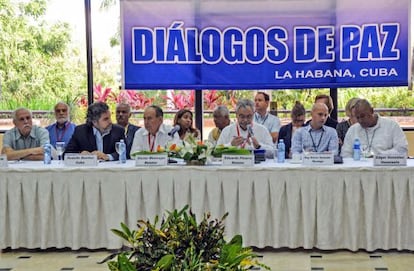Colombian rebels force 15,000 people from their homes every month
NGOs fear that the situation will not improve even after a peace treaty is signed with FARC

Despite ongoing peace talks taking place in Havana, the guerrilla war in Colombia has seen as many as 15,000 people displaced from their homes each month over the past two years, according to a study carried out by a Spanish NGO.
The Institute for Studies on Conflicts and Humanitarian Action (IECAH) found that nearly 348,000 people have been forced to leave their homes because of the armed conflict since talks began in late 2012. That said, the Madrid-based NGO – which was commissioned to conduct the study by the United Nations – also concluded that the numbers of mass displacements and land-mine victims have diminished.
The FARC and ELN are responsible for nearly half of all displacements
Nearly half of all displacements are caused by the guerrilla actions of the Revolutionary Armed Forced of Colombia (FARC) and the National Liberation Army (ELN), which officially declared war on the government in Bogota during the 1960s.
A ceasefire announced by the FARC has been kept intact since December as peace talks continue at a slow pace in Havana. Confident that those negotiations will conclude this year, President Juan Manuel Santos has also invited the ELN to engage in similar talks.
Still, the UN Office for the Coordination of Humanitarian Affairs (OCHA) states that 450,000 people have been uprooted from their communities since the peace talks with the FARC began in November 2012. What has diminished are the massive forced relocations that the guerrillas have employed in different communities, the OCHA stated.
The rebels have seen at least 1.4 million people in Colombia suffer limits to their freedom of movement, sometimes for as long as a week, the OCHA said, adding that such situations can be considered kidnappings. Many of them are threatened, stranded because of minefields, or are blocked from gaining access to roads.
The FARC has been responsible for at least 21 percent of these forced restrictions, said the IECAH, which adds that it doesn’t believe that the signing of a peace treaty will significantly improve the situation.
The UN estimates that 450,000 people have been uprooted from their homes since the peace talks began
Research also shows that the number of people who have been victims of minefields has dropped by 38 percent from figures taken from the period between 2010 and 2012. Nevertheless, antipersonnel mines, which are placed by the guerrillas to protect coca fields or keep the Colombian military from passing through an area, are still claiming lives or maiming victims.
Since the peace talks began, there have been 644 land-mine victims. “That means that each day a person – a military officer or a civilian – becomes a victim,” the researchers said.
Cleaning up minefields in Colombia is one of the points of discussion included in the Havana peace talks.
Tu suscripción se está usando en otro dispositivo
¿Quieres añadir otro usuario a tu suscripción?
Si continúas leyendo en este dispositivo, no se podrá leer en el otro.
FlechaTu suscripción se está usando en otro dispositivo y solo puedes acceder a EL PAÍS desde un dispositivo a la vez.
Si quieres compartir tu cuenta, cambia tu suscripción a la modalidad Premium, así podrás añadir otro usuario. Cada uno accederá con su propia cuenta de email, lo que os permitirá personalizar vuestra experiencia en EL PAÍS.
¿Tienes una suscripción de empresa? Accede aquí para contratar más cuentas.
En el caso de no saber quién está usando tu cuenta, te recomendamos cambiar tu contraseña aquí.
Si decides continuar compartiendo tu cuenta, este mensaje se mostrará en tu dispositivo y en el de la otra persona que está usando tu cuenta de forma indefinida, afectando a tu experiencia de lectura. Puedes consultar aquí los términos y condiciones de la suscripción digital.








































